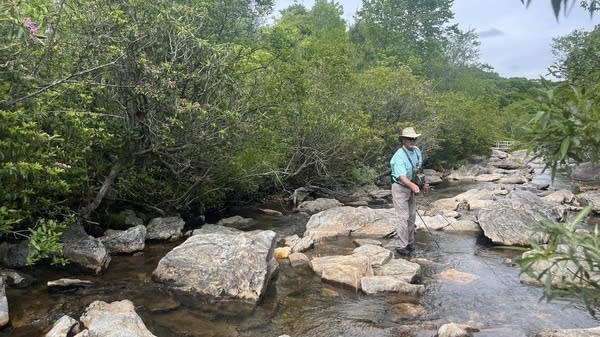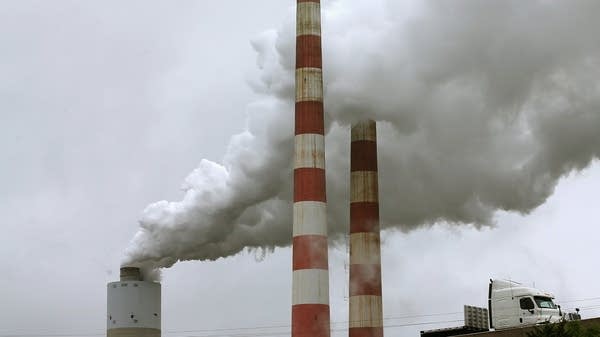Fishing brings western North Carolina billions, and it’s threatened by climate change
Outdoor outfitters and anglers are navigating the first post-Helene tourist season — and worrying about the future.

On a cool day in June, Thomas Champeau was ankle deep in the Yellowstone Prong Creek near Brevard, North Carolina.
Champeau was fishing for the elusive Southern Appalachian brook trout, which love the cool water here at 5,000 feet above sea level. He stepped lightly, casting his line into the calm pools.
“Your approach has to be low, quiet, and so it's a little bit like hunting ‘cause you're kind of stalking as opposed to just fishing blindly,” Champeau said, as he moved from one smooth rock to another.
All around, the mountain laurels were blooming. This landscape — the combination of solitude and recreation opportunities — draw millions of visitors to the region annually.
Champeau helps to lead a local chapter of Trout Unlimited, running their communications. As a former biologist, he’s trying to help anglers understand the fish’s climate sensitivity — and how storms like Helene have changed the trout habitat.
“It's amazing how those big rocks have moved,” Champeau said. “I mean, rocks bigger than a refrigerator have been pushed around.”
Trout are big business in western North Carolina — bringing the region $1.4 billion a year in tourism revenue. But they’re also sensitive creatures, especially the threatened native brook trout. They like cold, clear, rocky streams, and Hurricane Helene damaged a lot of streams, squeezing both trout and the businesses that depend on them.
This high-elevation stream is somewhat intact, but many downstream weren’t so lucky. Water gained momentum as it traveled downstream during the storm, pushing aside everything in its path. Bankside trees that used to provide shade were wiped out. Without shade, the water warms up, which is dangerous for cold-water fish. That affects not only the little trout but also the big fishing industry here.
Kevin Howell runs Davidson River Outfitters, a well-loved gear shop for anglers. He makes his living off his deep love and longtime knowledge of the local waterways.
“Born and raised in Transylvania County, grew up here, fished the river my entire life,” Howell said.
Howell said Helene hit his business hard. Anglers couldn’t even access some streams because so many trees fell down. “We did lose our two busiest months of the fall as far as income,” Howell said.
Some fishing guides just had to take other jobs.
Howell was hopeful as cleanup began, and federal debris cleanup contractors started work. But many of these contractors have caused concern for local residents, as they’ve been observed taking down trees and rolling heavy machinery up riverbeds. Clearing all that storm debris and fallen trees — that affected the rivers and creeks too, and, Howell worries, has slowed their recovery in myriad ways.
“All adding to the sedimentation and adding to the warmer temperatures, which, again, results in less fishable water and less fish and less habitat,” Howell finished.
Less fishable water means fewer opportunities for tourists. For example, in the summer, trout fishing is catch and release only in some waters since the fish are so sensitive. But if the water is already too hot, a trout might go belly up after the release.
“We had to make the decision today to stop fishing at noon because in the afternoons it's getting to 68° already in June,” Howell said, “which is very early.”
There are many other more commercially viable, heat-tolerant, and less sensitive fish than the brook trout, like the introduced rainbow and brown trout. However, one hatchery in the region was damaged by Helene, and another, in Transylvania County, is awaiting upgrades after damage from a previous storm. There’s also the bass, which Howell usually helps people find when it’s too hot for trout. But Helene washed the usual access points for bass fishing away.
The county still needs the tourists to come and fish, though, to pay for lodging, dinner, and guides. Tamika Hunter, with the Brevard Chamber of Commerce, said recreation is still possible. She sat behind the desk of her office in the Brevard visitors’ center.
“We're open with being sensitive to those who are still suffering, right?” she said.
Part of the problem is that many tourists assume the county’s rivers and mountains are totally destroyed, when in fact it’s recovering. But without the economic bedrock of tourists, more people will lose their jobs. “Because our economy here depends on our tourists. So we need them to come,” Hunter said.
Outside Hunter’s door, brook trout swam in a tank, their presence in the visitor center a sign of goodwill towards the fish and its survival, its future is intertwined as it is with the future of the county.
Back out on the Yellowstone Prong Creek, Thomas Champeau waved to a few of those much-needed tourists as they made their way down to catch a trout or two. Ultimately, though, nothing bit on Champeau’s line that day.
“But you never know!” Champeau said, packing up and walking back through the creek towards the trail. ”That’s why they call it fishing and not catching, right?”
More than likely, he’ll be back soon to his favorite spots to try again.













